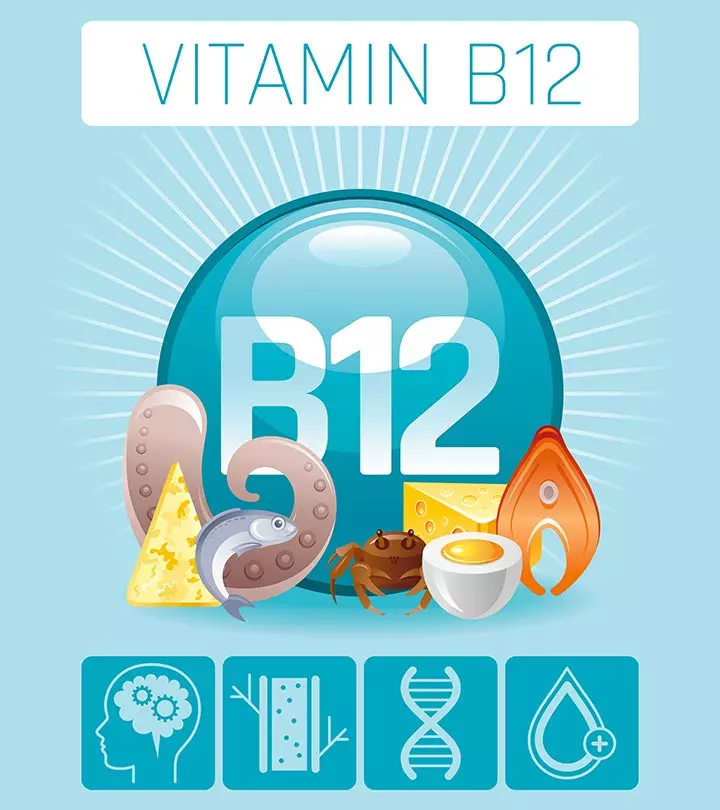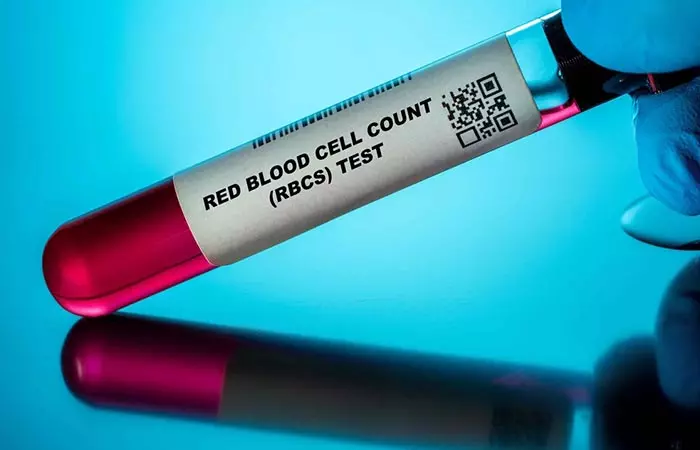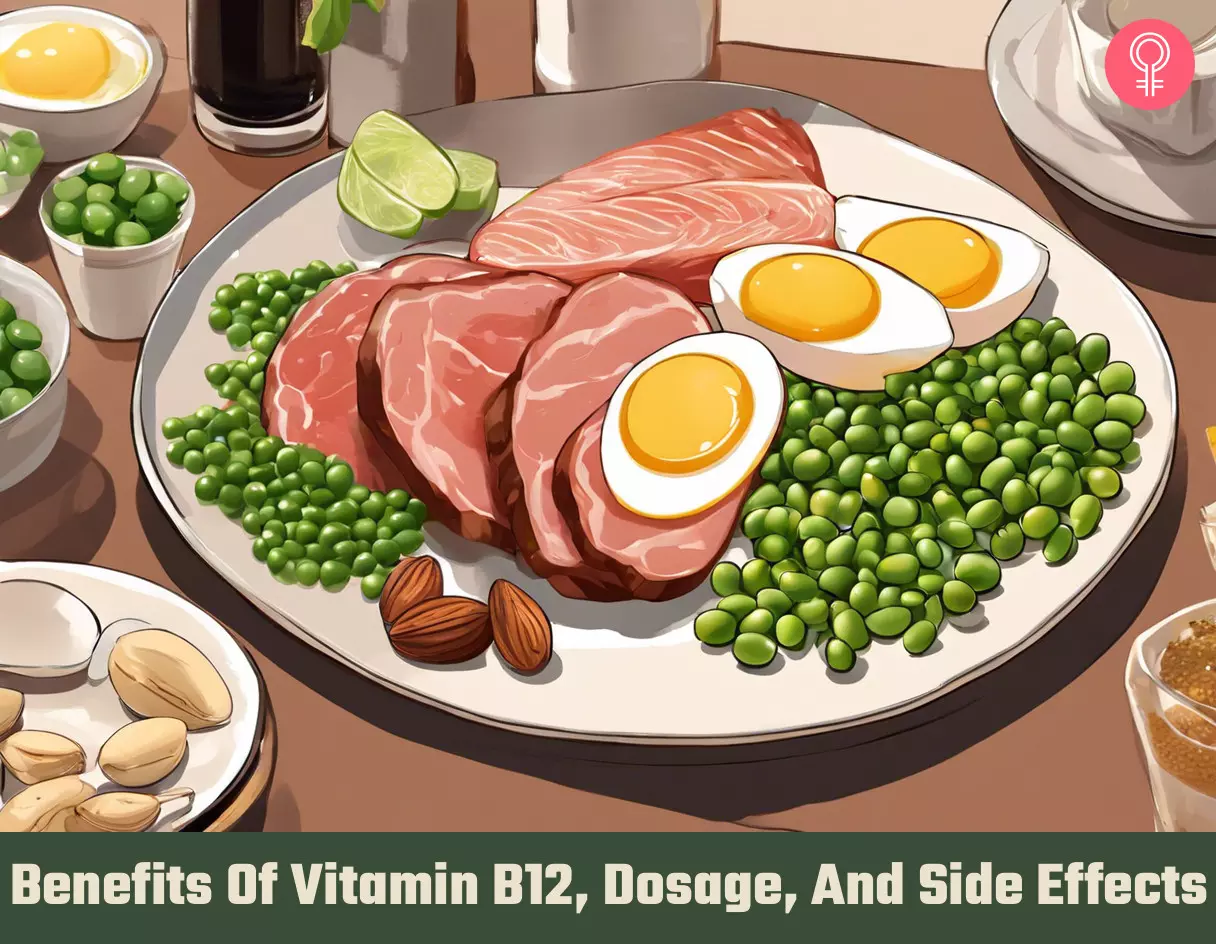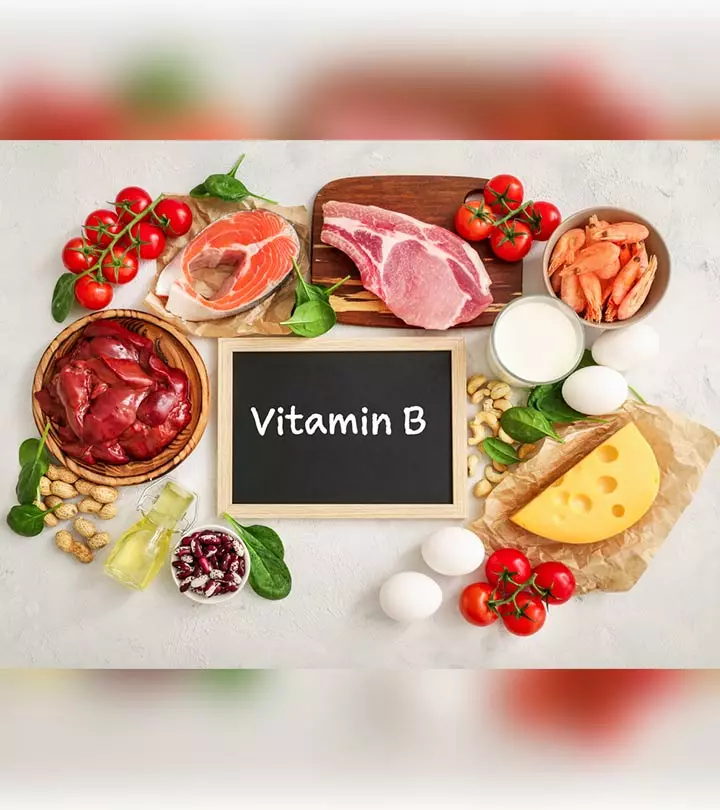Vitamin B12 Benefits: 16 Health-Boosting Effects
The much underrated group of nutrients that are actually vital to your wellbeing.

Image: Shutterstock
Vitamin B12 plays a vital role in many bodily functions. But the benefits of vitamin B12 are less discussed. In central and south America, Mexico, the Indian subcontinent, and some parts of Africa, Vitamin B12 deficiency is a severe issue (1).

Recognizing the advantages of this vitamin is important, as it carries numerous health benefits, such as improving heart health, helping manage skin diseases, improving memory, and helping with mood improvement. The daily dose of vitamin B12 is 2.4 micrograms in adults (2).
From the article below, know what it says about vitamin B12 and the benefits it offers. Also, look at which foods are rich in this vitamin and the symptoms of its deficiency. Scroll down!
In This Article
What Is Vitamin B12? How Does It Help?
Vitamin B12, also known as cobalamin, helps in the proper functioning of the body’s blood cells and nerves. It also plays a role in DNA synthesis (3).
The vitamin is also known for megaloblastic anemia prevention, a type of anemia that makes people weak. Studies have shown that a deficiency in this nutrient could lead to the condition (4).
Vitamin B12 is absorbed in the body in two steps. In food, this vitamin is attached to a protein. The hydrochloric acid in the stomach separates vitamin B12 from this protein synthesis. The vitamin then combines with another protein made by the stomach (called the intrinsic factor). It is then absorbed in the body (5).
Individuals with pernicious anemia (a decrease in red blood cells) may be deficient in vitamin B12, as their bodies do not have the ability to produce the intrinsic factor (3).
Vitamin B12 is important for performing various bodily functions. In the following section, we will discuss the crucial benefits of vitamin B12 in detail.
Key Takeaways
- Poor memory, muscle ache, weakness, and anxiety may be a few symptoms of Vitamin B12 deficiency.
- Your heart health and memory may improve if you include vitamin B12 in your routine.
- It may promote skin and hair health.
- Foods such as eggs, salmon, and tuna are rich in this vitamin.
- Vitamin B12 may interfere with certain medications.
What Are The Health Benefits Of Vitamin B12?
1. Helps In The Formation Of Red Blood Cells

Vitamin B12 (along with folate) helps in the formation of red blood cells. Without enough vitamin B12, red blood cells do not divide normally as they are supposed to and become too large. This makes them difficult to get out of the bone marrow (6).
This can result in fewer red blood cells in the bloodstream to carry oxygen to the body, leading one to feel tired and weak. This condition is also called pernicious anemia, and if not treated, it can damage the brain, heart, and other organs of the body (6).
2. May Prevent Birth Defects
Vitamin B12 is one of the crucial ingredients during pregnancy. A deficiency of this vitamin may cause infertility and recurrent abortions (7).
Starting pregnancy with a vitamin B12 deficiency may increase the risk of neural tube defects in the newborn. It may also lead to preterm delivery. The deficiency in the mother may also cause the same in the newborn if sufficient vitamin B12 is not available in breast milk. However, these implications need more research (7).
Women with vitamin B12 levels lower than 300 ng/L have a higher risk of delivering infants with birth defects (8). Increasing B12 levels beyond this may reduce the risk, though more research is warranted (8).
Vitamin B12 is required to create the new maternal and fetal cells and prevent neural tube defects in the newborn (9). It works together with folate to achieve this. A deficiency of vitamin B12 can also lead to folate deficiency, and this adversely affects pregnancy.
The vitamin may treat nausea and morning sickness, which are often associated with pregnancy. However, research in this aspect is limited.
3. Might Promote Skin Health
Vitamin B12 deficiency has been associated with changes in the skin.
The most common symptom is hyperpigmentation (10).
Other dermal complications of this deficiency include vitiligoi An autoimmune disease that causes loss of skin color in patches due to deficiency of melanin and also affects the mouth, hair, and eyes. and other skin lesionsi An abnormal change in the appearance of the skin or tissues that is usually caused due to trauma or disease. (11), (12).
Vitamin B12 can also help treat some serious skin ailments. One study found that a vitamin B12 cream could reduce the extent and severity of eczema. This was especially true in the case of eczema in children (13).
You can get the cream from a pharmacy. Apply it to the affected areas twice a day. Make sure you consult your doctor. B12 also helps with inflammation reduction and its side effects, and this is one reason it can counteract eczema.
Vitamin B12 may also help reduce shingles pain. Anecdotal evidence suggests that taking 1000 mcg of vitamin B12 on a daily basis may help treat the condition. However, as research is limited, we recommend you check with your doctor before using it.
Studies suggest that folic acid and vitamin B12, along with sun exposure, can induce repigmentation (14).
Vitamin B12 may also help fight cellulitei A condition where the fat deposition beneath the skin causes lumpy, dimpled flesh on thighs, buttocks, and stomach. , but there are limited studies to prove this.
4. May Improve Hair Health

Vitamin B12 helps in the formation of red blood cells. Some believe this may promote hair growth.
Vitamin B12 deficiency was observed in those with hair loss (15). At the base of hair follicles, we have tiny blood vessels that connect to the roots of each hair strand. These blood vessels carry oxygen to the hair, thereby boosting hair growth and preventing hair fall.
5. May Promote Heart Health
Vitamin B12 has shown potential for heart disease prevention and treatment. The nutrient lowered homocysteine (a particular amino acid), the high levels of which could elevate the risk of ischemic heart disease (16).
Deficiencies of B vitamins, in general, were linked to higher homocysteine levels and an increased risk of stroke (16). This may also cut down the long-term costs associated with expensive medical treatments.
Vitamin B12 was also found to reduce blood pressure in preschool children (17).
6. May Aid Diabetes Treatment
Though there is no direct link between vitamin B12 and diabetes treatment, the nutrient may treat diabetic retinopathy (damage of blood vessels in the eye) (18).
It may aid the treatment of diabetic neuropathy (nerve damage in the legs and feet), though further research is warranted (19). Anecdotal evidence suggests that the vitamin may also treat some of the symptoms of neuropathy, including numbness, pain, and a prickling sensation.
Vitamin B12 reduces homocysteine levels in the blood, which can otherwise lead to retinopathy (20).
More interestingly, metformin, a commonly prescribed diabetic drug, may cause vitamin B12 deficiency (21). This is why it might be a good idea to supplement it, especially in the case of diabetes. Pernicious anemia is vitamin B12 deficiency experienced in the case of type 1 diabetes (22).
7. May Help Maintain Bone Health
Low plasma levels of vitamin B12 have been linked to lower bone mineral density in humans. Studies suggest that the vitamin may affect bone formation. It has also been linked to osteoblastic activity (bone formation) (23).
High homocysteine levels and low vitamin B12 levels have also been associated with osteoporosisi A bone disease that causes bones to become weak and brittle due to low bone mineral density and decreased bone mass. (24). Since vitamin B12 helps lower homocysteine levels, it may play a beneficial role here.
In a study conducted on older women, lower levels of vitamin B12 were linked to increased hip bone loss (25).
8. May Help Prevent Macular Degeneration

Age-related macular degeneration has been associated with reduced plasma vitamin B12 levels and increased homocysteine levels. Intake of B12 supplementation may prevent the condition (26). However, more thorough studies are needed to understand the mechanism.
Another study also states that high levels of homocysteine may increase the risk of age-related macular degeneration (27). Since vitamin B12 helps lower the levels of this amino acid, it could be helpful in the treatment of AMD.
In another study in women, daily supplementation with folic acid, vitamin B12, and vitamin B6 over a seven-year period was found to reduce the risk of age-related macular degeneration (28).
9. May Boost Brain Health
Studies show that supplementing with vitamin B12 along with antidepressants may improve depressive symptoms. B12 deficiency may be associated with depression (29).
Adequate vitamin B12 levels may also increase the probability of recovery from depression. However, we need more studies to confirm this finding (30).
The vitamin may also have a beneficial effect on mood. It is believed the vitamin produces brain chemicals responsible for better mood stabilization, though we need more research to understand the mechanism. Anecdotal evidence suggests that it may help treat stress and certain anxiety disorders.
Vitamin B12, when combined with omega-3 fatty acids, could also slow down memory decline in adults. The nutrients improve cognitive function and also slow down the progression of mild cognitive impairment (31).
Another study states that the vitamin can prevent brain volume loss in the elderly. Individuals taking adequate vitamin B12 had a reduced risk of brain shrinkage/atrophy (32).
Vitamin B12 deficiency may also lead to dementia and Alzheimer’si A progressive neurodegenerative disease that causes impaired memory and mental functioning due to the shrinkage of brain cells. , although more studies are needed to understand the mechanism (33), (34).
As vitamin B12 also aids cell production (a process called methylation), it may help improve the symptoms of autismi A serious developmental disorder that affects the overall cognitive, emotional, and social ability of an individual to interact. (35).
10. May Help With Energy Production
Vitamin B12 plays a role in cellular energy production (36). However, there is no research stating that it may boost energy levels or improve athletic performance, as popularly believed.
Some research states that vitamin B12 deficiency could lead to increased levels of fatigue (37).
11. May Improve Sleep
There is limited research in this aspect. However, one study states that adequate vitamin B12 levels may improve sleep-wake rhythm disorders (38). This study has been conducted only on two patients, so we need more large-scale studies to understand the impact this vitamin can have on sleep quality.
It is believed that a deficiency of B12 may cause insomnia. However, more research is needed to establish the link.
12. May Help In The Treatment Of Fibromyalgia

It is believed that low levels of vitamin B12 may lead to fibromyalgiai A disorder characterized by widespread musculoskeletal pain and tenderness, accompanied by fatigue, altered sleep, and mood issues. and chronic fatigue syndrome. There is a lack of research in this aspect.
One study states that vitamin B12 injections may work as analgesics, thereby aiding the treatment of fibromyalgia (39).
Other research also links fibromyalgia to higher levels of homocysteine in the blood (40). As vitamin B12 lowers homocysteine levels, it may potentially aid in the treatment of fibromyalgia.
13. May Help Improve Symptoms Of Tinnitus
Tinnitus is a condition characterized by a buzzing sensation in the ears. One study states that vitamin B12 may improve the symptoms of tinnitus (41).
The deficiency of vitamin B12 has been linked to chronic tinnitus and noise-induced hearing loss.
Insufficient Evidence For The Following
14. May Stabilize Digestive Health
Vitamin B12 is believed to help with the production of digestive enzymes, which promote digestive health and ensure the proper breakdown of food. The nutrient could foster the gut environment by promoting the growth of healthy gut bacteria.
It is also believed to eliminate the harmful bacteria in the gut, possibly preventing other digestive system health issues like inflammatory bowel disease.
15. May Help With Weight Loss
Though we need more research, some reports state that vitamin B12 helps the body convert fat into energy and also aids the breakdown of carbs.
The vitamin may boost your metabolism, and some believe this may help with weight loss.
However, please consult your doctor before using B12 for this purpose.
16. May Prevent Mosquito Bites

Though we don’t know if it can ease mosquito bites, some believe vitamin B12 may repel mosquitoes. It is thought to exude a mosquito repellent-like smell. However, we suggest you talk to a specialist before using it for this purpose.
The following are some of the best food sources of vitamin B12 (42):
- Beef and chicken liver (3 ounces contain 3,375% RDA of the vitamin)
- Salmon (A 108-gram filet contains 821% RDA)
- Tuna (3 ounces contain 385% of the RDA)
- Organic yogurt (1 container of 170 grams contains 53% of the RDA)
- Raw milk (1 cup contains 41% of the RDA)
- Lamb (3 ounces contains 34% of the RDA)
- Low-fat yogurt (8 ounces contains 18% of the RDA)
- Egg (1 large whole egg contains 10% of the RDA)
- Roasted chicken breast (3 ounces contains 5% of the RDA)
 Trivia
TriviaThis list isn’t exhaustive. You can explore more options and learn about vitamin B12 foods and incorporate them into your diet. This will help you prevent any deficiencies and issues caused by the lack of it. Vitamin B12 deficiency often manifests itself through various signs. Knowing more about them may also help you take precautions. Keep reading to know more.
What Are The Symptoms Of Vitamin B12 Deficiency?
The following are some of the most common symptoms of the deficiency:
- Muscle aches
- Weakness/chronic fatigue
- Poor memory
- Dizziness
- Anxiety and mood swings/depression
- Heart palpitations
- Nausea and abdominal cramping
- A poor appetite
Gabriana, a lifestyle blogger, shared her experience of getting diagnosed with vitamin B12 deficiency and how severe her symptoms were. Because of the deficiency, she got a condition called Autoimmune Pernicious Anemia which made her life difficult. She said, “I was too tired to chew and I was so weak. I could barely crawl to the bathroom. I needed a walker or wheelchair to go anywhere and I didn’t have the strength or coordination in my hands to button/zip/tie any clothing or shoes. I couldn’t stand any light, loud noises, strong smells or even bright colors (i).”
Taking adequate vitamin B12 can help you avoid these symptoms. Find out the recommended dosage in the next section.
What Is The Recommended Vitamin B12 Dosage?
The following table can help you with the details (2):
| Age Group | RDA | ||
|---|---|---|---|
| 0 to 6 months | 8 ounces | ||
| 7 to 12 months | 0.5 mcg | ||
| 1 to 3 years | 0.9 mcg | ||
| 4 to 8 years | 1.2 mcg | ||
| 9 to 13 years | 1.8 mcg | ||
| 14 years and older | 2.4 mcg | ||
| Adult and adolescent pregnant females | 2.6 mcg | ||
| Adult and adolescent lactating females | 2.8 mcg |
What About Vitamin B12 Shots? Who Needs Them?
These are the synthetic versions of the vitamin. You can take vitamin B12 from foods or acquire the vitamin from a man-made version of the nutrient known as cyanocobalamin.
Vitamin B12 shots are nothing but injections containing very high amounts of cyanocobalamin. These shots can quickly boost the vitamin B12 levels in the individual.
Who needs them? You need these shots only if you are severely deficient (or are at risk) in vitamin B12. Vitamin B12 injections are available only by prescription, which means a clinical diagnosis is a must. You can’t (and shouldn’t) administer the shots on your own without the advice of a doctor or dietitian (43).
The following factors can increase the risk of vitamin B12 deficiency:
- Smoking
- Alcohol abuse
- Sticking to a vegetarian or vegan diet
- Aging
- Thyroid disorder
- People on certain diabetes medications
- Gastrointestinal disorders like Crohn’s diseasei A chronic inflammatory bowel disease that causes the digestive tract to become swollen and irritated, causing pain and diarrhea.
- Surgical removal of parts of the stomach
One major benefit of vitamin B12 shots is that they bypass the stomach and are directly absorbed into the bloodstream. Hence, in case you have gastrointestinal issues or had stomach surgeries, these shots could be a better option over oral supplements.
 Trivia
TriviaIs everyone at risk of a vitamin B12 deficiency? Scroll down to learn more.
Who Is At Risk Of A Vitamin B12 Deficiency?
Some people are at a higher risk of lacking vitamin B12, such as older adults with conditions like atrophic gastritis or pernicious anemia. It is found that up to 43% older adults living in Ontario, Canada have a B12 deficiency based on serum levels (46). Pernicious anemia, an autoimmune disease, is a leading cause of B12 deficiency worldwide (47). Those with gastrointestinal issues, such as celiac disease and Crohn’s disease, may also face an issue with B12 absorption (48). Those who have undergone stomach surgery may face similar problems. Vegans and vegetarians, who don’t eat animal products, need to be careful because B12 mainly comes from animal foods (49). Newborns of vegan moms are also vulnerable to a B12 deficiency if not properly monitored during breastfeeding (50).
Side Effects Of Excess Vitamin B12
Vitamin B12 is water-soluble. This means that excess of it can pass out of your system through urine. Vitamin B12 has not shown to cause any harm. However, certain medications can interfere with your body’s ability to absorb vitamin B12. The most common of these include antiepileptici A class of drugs that help control abnormal brain activity and decrease the episodes of seizures. drugs (44).
Vitamin B12 can also interfere with metformin, the anti-diabetes drug (21). It can also interfere with Proton Pump Inhibitors, drugs used to treat acid reflux and peptic ulcers (45).
Infographic: Causes Of Vitamin B12 Deficiency
Vitamin B12 (cobalamin) is an essential nutrient for proper body functioning. This vitamin has many benefits, from helping to form red blood cells to improving sleep quality. However, deficiency of vitamin B12 may lead to several adverse effects. Apart from dietary deficiency, vitamin B12 deficiency may occur due to many underlying medical health issues. Check out the infographic below to learn about the causes of vitamin B12 deficiency.
Some thing wrong with infographic shortcode. please verify shortcode syntax
The benefits of vitamin B12 are numerous. It can improve your overall health if included as a part of your daily diet. Vitamin B12 can help form red blood cells, prevent congenital disabilities, and promote skin, hair, cardiovascular, bone, brain, and digestive health. Other benefits of B12 include weight loss and improved sleep. It may also aid in treating fibromyalgia and diabetes. Foods like beef, chicken liver, salmon, tuna, raw milk, lamb, egg, and organic yogurt are the best sources of vitamin B12. Try including these foods regularly in your diet to minimize the risk of vitamin B12 deficiency. Vitamin B12 in the form of methylcobalamin and adenosylcobalamin may offer benefits for nervous system function. However, a proper dosage of vitamin B12 is important to avoid potential side effects.
Frequently Asked Questions
Is vitamin B12 water-soluble?
Yes, B12, just like other B vitamins, is water-soluble. This simply means that having an overdose of vitamin B12 is highly unlikely as it dissolves in water, and the remaining amount is passed out through urine.
What is the best time to take a vitamin B12 supplement?
In the mornings, after breakfast, or during lunch. You may also take vitamin B12 during the night. But since they promote energy generation, taking it in the day could be ideal (information on this is mixed, though).
Vitamin B12 supplements may work between 48 to 72 hours, especially if they are taken by someone who is deficient in the vitamin.
Is too much vitamin B12 bad for you?
Not really. As we discussed, B12 is a water-soluble vitamin. Maintain your dosage as per the recommended levels or as directed by your healthcare provider.
Is vitamin B12 good for treating erectile dysfunction?
There is no research on this. If you are going to use the vitamin for treating ED, make sure to consult your doctor.
Can vitamin B12 cause pimples?
There is no evidence here. If you experience pimples, it could mean some underlying condition. Consult a dermatologist.
How long should I take B12 supplements?
Vitamin B12 supplements may take anywhere between six months to a year to address your deficiency. However, always consult with your doctor first before you choose to take or extend the dose of your B12 supplements.
Illustration: Benefits Of Vitamin B12, Dosage, And Side Effects

Image: Stable Diffusion/StyleCraze Design Team
Worried about a potential B12 deficiency? Check out this informative video that uncovers the 7 warning signs to keep an eye on and helps you take proactive steps towards better health.
Personal Experience: Source
StyleCraze's articles are interwoven with authentic personal narratives that provide depth and resonance to our content. Below are the sources of the personal accounts referenced in this article.
i At age 33 I learned why I’d been sick all my lifehttps://nosyparkerblog.com/2016/09/23/at-age-33-i-learned-why-id-been-sick-all-my-life/
References
Articles on StyleCraze are backed by verified information from peer-reviewed and academic research papers, reputed organizations, research institutions, and medical associations to ensure accuracy and relevance. Read our editorial policy to learn more.
- Vitamin B12 deficiency as a worldwide problem, Annual Review of Nutrition, US National Library of Medicine, National Institutes of Health.
https://pubmed.ncbi.nlm.nih.gov/15189123/ - Vitamin B12, Dietary Reference Intakes for Thiamin, Riboflavin, Niacin, Vitamin B6, Folate, Vitamin B12, Pantothenic Acid, Biotin, and Choline, National Center for Biotechnology Information.
https://www.ncbi.nlm.nih.gov/books/NBK114302/ - Vitamin B12 Deficiency (Cobalamin), National Center for Biotechnology Information.
https://www.ncbi.nlm.nih.gov/books/NBK441923/ - Vitamin B12 deficiency–a major cause of megaloblastic anaemia in patients attending a tertiary care hospital, Journal of Ayub Medical College, Abbottabad, US National Library of Medicine, National Institutes of Health.
https://pubmed.ncbi.nlm.nih.gov/20929023/ - NEONATAL BLOOD PRESSURE AND PULSE RATE, British Medical Journal.
https://www.ncbi.nlm.nih.gov/pmc/articles/PMC2026244/pdf/brmedj03062-0028.pdf - The metabolic processes of folic acid and Vitamin B12 deficiency, Journal of Health Research and Reviews in Developing Countries.
https://www.jhrr.org/article.asp?issn=2394-2010;year=2014;volume=1;issue=1;spage=5;epage=9;aulast=Mahmood - Effects of folate and vitamin B12 deficiencies during pregnancy on fetal, infant, and child development, Food and Nutrition Bulletin, US National Library of Medicine, National Institutes of Health.
https://pubmed.ncbi.nlm.nih.gov/18709885/ - Maternal Vitamin B12 Status and Risk of Neural Tube Defects in a Population With High Neural Tube Defect Prevalence and No Folic Acid Fortification, Pediatrics, US National Library of Medicine, National Institutes of Health.
https://www.ncbi.nlm.nih.gov/pmc/articles/PMC4161975/ - B12 in fetal development, Seminars in Cell & Developmental Biology, US National Library of Medicine, National Institutes of Health.
https://pubmed.ncbi.nlm.nih.gov/21664980/ - A review of vitamin B12 in dermatology, American Journal of Clinical Dermatology, US National Library of Medicine, National Institutes of Health.
https://pubmed.ncbi.nlm.nih.gov/25559140/ - DIET IN DERMATOLOGY: PRESENT PERSPECTIVES, Indian Journal of Dermatology, US National Library of Medicine, National Institutes of Health.
https://www.ncbi.nlm.nih.gov/pmc/articles/PMC2965901/ - Cutaneous lesions and vitamin B12 deficiency, Canadian Family Physician, US National Library of Medicine, National Institutes of Health.
https://www.ncbi.nlm.nih.gov/pmc/articles/PMC2294086/ - Evaluation of topical vitamin B(12) for the treatment of childhood eczema, Journal of Alternative and Complementary Medicine, US National Library of Medicine, National Institutes of Health.
https://pubmed.ncbi.nlm.nih.gov/19368512/ - Improvement of vitiligo after oral treatment with vitamin B12 and folic acid and the importance of sun exposure, Acta dermato-venereologica, US National Library of Medicine, National Institutes of Health.
https://pubmed.ncbi.nlm.nih.gov/9394983/ - The Role of Vitamins and Minerals in Hair Loss: A Review, Dermatology and Therapy, US National Library of Medicine, National Institutes of Health.
https://www.ncbi.nlm.nih.gov/pmc/articles/PMC6380979/ - Genetic Associations with Plasma B12, B6, and Folate Levels in an Ischemic Stroke Population from the Vitamin Intervention for Stroke Prevention (VISP) Trial, Frontiers in Public Health, US National Library of Medicine, National Institutes of Health.
https://pubmed.ncbi.nlm.nih.gov/25147783/ - Dietary Intake of Vitamin B12 and Folic Acid Is Associated With Lower Blood Pressure in Japanese Preschool Children, American Journal of Hypertension, Oxford Academic Journals.
https://academic.oup.com/ajh/article/24/11/1215/2281951 - DIABETIC RETINOPATHY AND CYANCOBALAMIN (VITAMIN B12), British Journal of Ophthalmology.
https://www.ncbi.nlm.nih.gov/pmc/articles/PMC509731/pdf/brjopthal00467-0068.pdf - Effectiveness of vitamin B12 on diabetic neuropathy: systematic review of clinical controlled trials, Acta neurologica Taiwanica, US National Library of Medicine, National Institutes of Health.
https://pubmed.ncbi.nlm.nih.gov/16008162/ - Role of hyperhomocysteinemia in proliferative diabetic retinopathy: A case–control study, Indian Journal of Ophthalmology, US National Library of Medicine, National Institutes of Health.
https://www.ncbi.nlm.nih.gov/pmc/articles/PMC6173030/ - Long-term Metformin Use and Vitamin B12 Deficiency in the Diabetes Prevention Program Outcomes Study, The Journal of Clinical Endocrinology and Metabolism, US National Library of Medicine, National Institutes of Health.
https://www.ncbi.nlm.nih.gov/pmc/articles/PMC4880159/ - Vitamin B12 deficiency among patients with diabetes mellitus: is routine screening and supplementation justified? Journal of Diabetes and Metabolic Disorders, US National Library of Medicine, National Institutes of Health.
https://www.ncbi.nlm.nih.gov/pmc/articles/PMC3649932/ - Low plasma vitamin B12 is associated with lower BMD: the Framingham Osteoporosis Study, Journal of Bone and Mineral Research, US National Library of Medicine, National Institutes of Health.
https://pubmed.ncbi.nlm.nih.gov/15619681/ - The relationship of homocyteine, B12 and folic acid with the bone mineral density of the femur and lumbar spine in Turkish postmenopausal women, Archives of Gynecology and Obstetrics, US National Library of Medicine, National Institutes of Health.
https://pubmed.ncbi.nlm.nih.gov/19151987/ - Low serum vitamin B-12 levels are associated with increased hip bone loss in older women: a prospective study, The Journal of Clinical Endocrinology and Metabolism, US National Library of Medicine, National Institutes of Health.
https://pubmed.ncbi.nlm.nih.gov/15001613/ - Homocysteine and the risk of age-related macular degeneration: a systematic review and meta-analysis, Scientific Reports, US National Library of Medicine, National Institutes of Health.
https://www.ncbi.nlm.nih.gov/pmc/articles/PMC4508850/ - Evaluation of plasma homocysteine and risk of age-related macular degeneration, American Journal of Ophthalmology, US National Library of Medicine, National Institutes of Health.
https://pubmed.ncbi.nlm.nih.gov/16387004/ - Folic Acid, Vitamin B6, and Vitamin B12 in Combination and Age-related Macular Degeneration in a Randomized Trial of Women, Archives of Internal Medicine, US National Library of Medicine, National Institutes of Health.
https://www.ncbi.nlm.nih.gov/pmc/articles/PMC2648137/ - Vitamin B12 Supplementation in Treating Major Depressive Disorder: A Randomized Controlled Trial, The Open Neurology Journal, US National Library of Medicine, National Institutes of Health.
https://www.ncbi.nlm.nih.gov/pmc/articles/PMC3856388/ - High vitamin B12 level and good treatment outcome may be associated in major depressive disorder, BMC Psychiatry, US National Library of Medicine, National Institutes of Health.
https://pubmed.ncbi.nlm.nih.gov/14641930/ - Omega-3 Fatty Acid Status Enhances the Prevention of Cognitive Decline by B Vitamins in Mild Cognitive Impairment, Journal of Alzheimer’s Disease, US National Library of Medicine, National Institutes of Health.
https://www.ncbi.nlm.nih.gov/pmc/articles/PMC4927899/ - Vitamin B12, cognition, and brain MRI measures, A cross-sectional examination, Neurology.
https://n.neurology.org/content/77/13/1276 - Neuropsychology of vitamin B12 deficiency in elderly dementia patients and control subjects, Journal of Geriatric Psychiatry and Neurology, US National Library of Medicine, National Institutes of Health.
https://pubmed.ncbi.nlm.nih.gov/15681626/ - Vitamin B12 levels in Alzheimer’s disease: association with clinical features and cytokine production, Journal of Alzheimer’s Disease, US National Library of Medicine, National Institutes of Health.
https://pubmed.ncbi.nlm.nih.gov/20110595/ - Randomized, Placebo-Controlled Trial of Methyl B12 for Children with Autism, Journal of Child and Adolescent Psychopharmacology, US National Library of Medicine, National Institutes of Health.
https://pubmed.ncbi.nlm.nih.gov/26889605/ - Vitamin B12 in Health and Disease, Nutrients, US National Library of Medicine, National Institutes of Health.
https://www.ncbi.nlm.nih.gov/pmc/articles/PMC3257642/ - Association of vitamin B12 deficiency with fatigue and depression after lacunar stroke, PloS One, US National Library of Medicine, National Institutes of Health.
https://pubmed.ncbi.nlm.nih.gov/22276208/ - Vitamin B12 treatment for sleep-wake rhythm disorders, Sleep, US National Library of Medicine, National Institutes of Health.
https://pubmed.ncbi.nlm.nih.gov/2305167/ - Response to vitamin B12 and folic acid in myalgic encephalomyelitis and fibromyalgia, PloS One, US National Library of Medicine, National Institutes of Health.
https://pubmed.ncbi.nlm.nih.gov/25902009/ - Increased concentrations of homocysteine in the cerebrospinal fluid in patients with fibromyalgia and chronic fatigue syndrome, Scandinavian Journal of Rheumatology, US National Library of Medicine, National Institutes of Health.
https://pubmed.ncbi.nlm.nih.gov/9310111/ - Therapeutic role of Vitamin B12 in patients of chronic tinnitus: A pilot study, Noise & Health, US National Library of Medicine, National Institutes of Health.
https://www.ncbi.nlm.nih.gov/pmc/articles/PMC4918681/ - Vitamin B12 Content in Foods, USDA National Nutrient Database for Standard Reference Release 28.
https://ods.od.nih.gov/pubs/usdandb/VitaminB12-Content.pdf - Oral vitamin B12 versus intramuscular vitamin B12 for vitamin B12 deficiency, Canadian Institutes of Health Research, US National Library of Medicine, National Institutes of Health.
https://www.ncbi.nlm.nih.gov/pmc/articles/PMC5112015/ - Antiepileptic drugs interact with folate and vitamin B12 serum levels, Annals of Neurology, US National Library of Medicine, National Institutes of Health.
https://pubmed.ncbi.nlm.nih.gov/21246600/ - Proton pump inhibitors and risk of vitamin and mineral deficiency: evidence and clinical implications, Therapeutic Advances in Drug Safety, US National Library of Medicine, National Institutes of Health.
https://www.ncbi.nlm.nih.gov/pmc/articles/PMC4110863/ - Vitamin B12 status in older adults living in Ontario long-term care homes: prevalence and incidence of deficiency with supplementation as a protective factor
https://pubmed.ncbi.nlm.nih.gov/26781161/ - Factors related to low serum vitamin B12 levels in elderly patients with non-atrophic gastritis in contrast to patients with normal vitamin B12 levels
https://pubmed.ncbi.nlm.nih.gov/26044795/ - High prevalence of vitamin B-12 insufficiency in patients with Crohn’s disease
https://pubmed.ncbi.nlm.nih.gov/28917233/ - The prevalence of cobalamin deficiency among vegetarians assessed by serum vitamin B12: a review of literature
https://pubmed.ncbi.nlm.nih.gov/24667752/
Read full bio of Dr. Abby Kramer
Read full bio of Ravi Teja Tadimalla
Read full bio of Arshiya Syeda
Read full bio of Aparna Mallampalli



























Community Experiences
Join the conversation and become a part of our empowering community! Share your stories, experiences, and insights to connect with other beauty, lifestyle, and health enthusiasts.